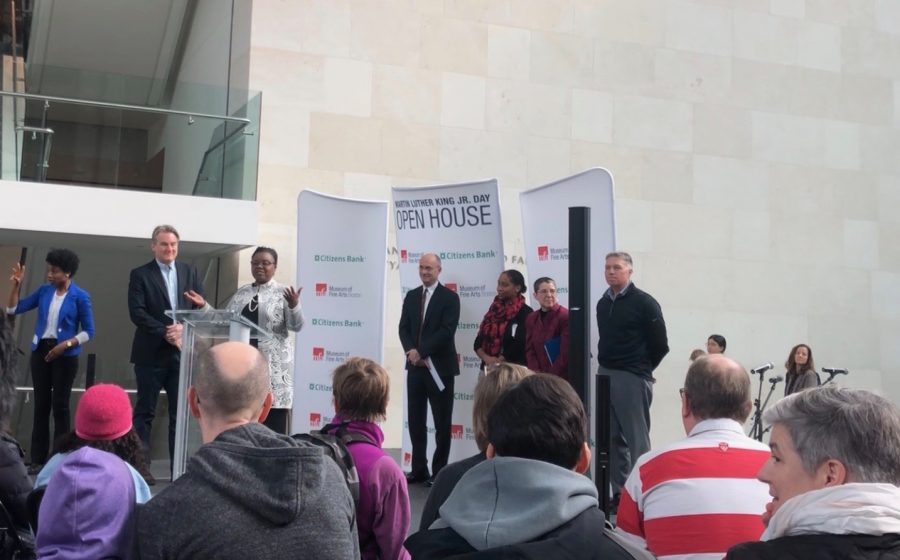MFA hosts open house devoted to Martin Luther King Jr., and the intersections of social justice and culture
Politician and activist Marie St. Fleur delivers opening remarks at MFA open house event.
January 27, 2019
The Museum of Fine Arts held a free open house to commemorate Martin Luther King Jr. on Jan. 21. Hundreds of visitors flooded the museum to celebrate the King’s legacy, honoring his messages of peace and acceptance.
The celebration promised various tours, speeches, art displays and concerts, all paying homage to black artistry. It started at 10 a.m. with a warm welcome from Marie St. Fleur, a Haitian-American politician and activist. She is collaborating with Boston-based philanthropist Paul English on an ambitious project: a nonprofit called King Boston. This organization seeks to memorialize the life of Martin Luther King Jr. and Coretta Scott King, as well as create a welcoming, progressive, and compassionate community.
“Paul English had this amazing vision: that we collectively can come up with a concept of how to represent the wonderful vision and life of Coretta Scott and Dr. Martin Luther King Jr. here in this great city of ours,” St. Fleur said.“We are that city, on top of that hill, that continues to shine and be a beacon for what we ought to be: a place that truly celebrates liberty, equity and the inclusion of all people.”
The organization intends to build an MLK memorial in Boston Common. Currently, it is planning to develop the King Center for Economic Opportunity, an institution committed to helping combat racial inequalities and promoting justice in low-income neighborhoods.
As presenters wrapped up their speeches, MFA director Matthew Teitelbaum approached the podium.
“You, as our community, believe in this space, believe in art, believe in something in this building and in this proposition of a great museum that can lead the path forward to the future,” Teitelbaum said. “And you coming here reminds us of that. So I just want to say: May you always feel at home here, and may this always be your museum.”
Many students agreed with Teitelbaum, commenting on the power of the museum and its subsequent cultural impact.
MFA Teen Arts Council member Brianna Harvey mentioned the cultural presence in the museum.
“The museum is a very diverse environment from a lot of time periods, including, I believe, 6000 B.C. to the present,” Harvey said. “And since art really connects everyone, from all backgrounds, I think it’s just a good place to have [the celebration].”
Castle of Our Skins, an organization dedicated to celebrating black artistry through music, performed at the event. The organization’s artistic and executive director Ashe Gordon discussed the history of the group. After meeting associate artistic director Anthony Green, Gordon undertook a difficult task: unearthing the histories of hundreds of black musicians.
“Between the two of us, we could list a handful, maybe not even all the fingers on our hand, of black composers, after all of our conservatory training,” Gordon said. “And we wanted to, a bit of a challenge for ourselves, wanted to educate ourselves. And in digging, there’s obviously a whole world to be excavated.”
The organization’s name is linked to a poem about Nina Simone, which references the skin being a prison.
“To paraphrase, it says ‘we are all imprisoned in the castle of our skins,’” Gordon said. “And some of us have said, if that’s the case, I’m going to adorn it with beautiful things and fill it with all this amazingness and really love my castle. So treating the skin, not as a prison, but as something to be celebrated.”
Gordon criticized the tendency of people to designate specific days to celebrate black excellence, rather than commemorating it year-round.
“If we want it to be commonplace, it should happen, yes, on MLK day, as well as in March, and in October, and November, and a regular concert in December,” Gordon said. “So if you want it to be normal, it needs to be 365 days like everything else.”
Elson Raymos, a sophomore at Edward M. Kennedy Academy for Health Careers, agreed.
“With the impact [the Kings] have made, I feel like we should always appreciate them, not just on that one specific day,” Raymos said.
Project STEP, a rigorous after-school musical program for students of color, also performed at the event. The group has a clear mission: to reflect the ethnically diverse communities of Boston and apply that to the classical music field.
Jodie McMenamin, a manager for Project STEP, said the program is not only a healthy community, but a family.
“The program, which is sort of this rigorous program, ends up teaching not only music, but also life skills … about partnership and collaboration,” McMenamin said. “And often the kids, because of their music training, are the kids who are doing better in their school. ”
Project STEP has been nationally acclaimed, winning the 2014 National Arts and Humanities Youth Program Award. Two years later, the students were invited back to the White House to perform for the Obamas, as well as the president and first lady of Singapore. Yet despite the musical inclination, McMenamin stressed that the program is also just as focused on social justice and community improvement.
“The focus is music first, but we’re really talking about the struggle that it is to be a musician of color within today’s society,” McMenamin said. “It really becomes a safe place for many of these families, and it’s an incredible opportunity to bring social justice in a cultural way into Boston.”







